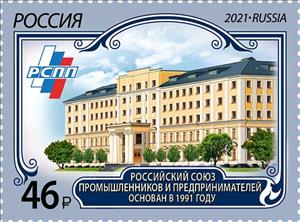Stamp: Union of Industrialists and Entrepreneurs, 30th Anniversary (Russia 2021)
Union of Industrialists and Entrepreneurs, 30th Anniversary (Russia 2021)
17 December (Russia ) within release Union of Industrialists and Entrepreneurs, 30th Anniversary goes into circulation Stamp Union of Industrialists and Entrepreneurs, 30th Anniversary face value 46 Russian ruble
| Stamp Union of Industrialists and Entrepreneurs, 30th Anniversary in catalogues | |
|---|---|
| Colnect codes: | Col: RU 2021-86 |
Stamp is horizontal format.
Also in the issue Union of Industrialists and Entrepreneurs, 30th Anniversary:
- Stamp - Union of Industrialists and Entrepreneurs, 30th Anniversary face value 46;
- Mini Sheet - Union of Industrialists and Entrepreneurs, 30th Anniversary face value 12*46;
Stamp Union of Industrialists and Entrepreneurs, 30th Anniversary it reflects the thematic directions:
A building or edifice is a structure with a roof and walls standing more or less permanently in one place, such as a house or factory. Buildings come in a variety of sizes, shapes and functions, and have been adapted throughout history for a wide number of factors, from building materials available, to weather conditions, to land prices, ground conditions, specific uses and aesthetic reasons. Buildings serve several needs of society – primarily as shelter from weather, security, living space, privacy, to store belongings, and to comfortably live and work. A building as a shelter represents a physical division of the human habitat (a place of comfort and safety) and the outside (a place that at times may be harsh and harmful).
An economy is an area of the production, distribution and trade, as well as consumption of goods and services. In general, it is defined as a social domain that emphasize the practices, discourses, and material expressions associated with the production, use, and management of resources. A given economy is a set of processes that involves its culture, values, education, technological evolution, history, social organization, political structure, legal systems, and natural resources as main factors. These factors give context, content, and set the conditions and parameters in which an economy functions. In other words, the economic domain is a social domain of interrelated human practices and transactions that does not stand alone.
Logos is a term used in Western philosophy, psychology and rhetoric, as well as religion (notably Christianity); among its connotations is that of a rational form of discourse that relies on inductive and deductive reasoning.



